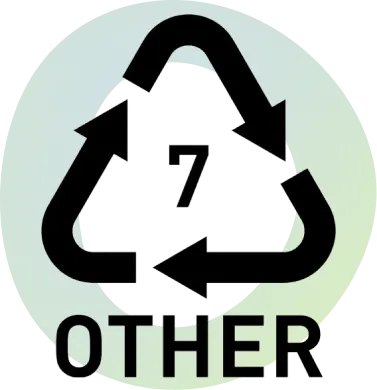Polycarbonate (PC)
Polycarbonate (PC) Recycling
Reclaim
Polycarbonate, or “PC”, is a widely applicable plastic with characteristics like high impact resistance, good geometrical stability, extremely high internal light transmission (almost 90% as well as glass), chemical and heat resistance, and electrically insulative properties that do not fluctuate largely with changes in temperature. As a result, this plastic is often used in car headlight covers, compact discs, bullet-proof glass, and a wide range of other – often mechanical – applications [1].
The wide range of applications for which polycarbonate is a suitable plastic result in it being one of the most largely produced thermoplastics in the world, with approximately 2.7 million tons of it being produced annually, since 2016 [2].
Polycarbonate plastics are fully recyclable, though many processes involve first reacting the polycarbonate with various reactants to reduce it into other, more easily recyclable forms of plastic. This is necessary as the synthesis of polycarbonates often involves bisphenol A, more commonly referred to as BPA, which can leach into the environment when polycarbonate waste comes into contact with water, through hydrolysis [3].
This can be an issue especially in landfills or other areas when polycarbonate waste is left in the environment, as BPA is a potential hazardous chemical. Other alternative recycling processes for polycarbonates include chemical recycling, where upon the introduction of phenol, new monomers are produced which can be re-used for further polymerization [1].
Mechanical recycling processes for polycarbonate are similar to those of polypropylene and other rigid plastics; after sorting and removing any impurities from the plastic samples (either manually, through techniques such as density separation, or with more sophisticated sorting machinery and technology), the waste is reground into small fragments, which can be used as recycled input for new manufacturing processes.

Polycarbonate does not have a unique resin identification code, instead falling under 7, or “other”.
References
[1] Omnexus, “Polycarbonate (PC) Plastic: Properties, Uses, & Structure – Guide,” Specialchem.com, 2018. https://omnexus.specialchem.com/selection-guide/polycarbonate-pc-plastic (accessed Jul. 28, 2021).
[2] B. Yirka, “A new way to recycle polycarbonates that prevents BPA leaching,” phys.org, Jun. 28, 2016. https://phys.org/news/2016-06-recycle-polycarbonates-bpa-leaching.html (accessed Jul. 28, 2021).
[3] T. Rogers, “Everything You Need To Know About Polycarbonate (PC),” Creativemechanisms.com, Aug. 21, 2015. https://www.creativemechanisms.com/blog/everything-you-need-to-know-about-polycarbonate-pc (accessed Jul. 28, 2021).

Carstar
“We are proud to recycle our scrap bumper plastics rather than add to the landfill. Reclaim has helped us do this.”
Kris Kurman
Manager
Schedule an appointment today!
Reclaiming our environment by Reclaiming the plastic waste we produce.

